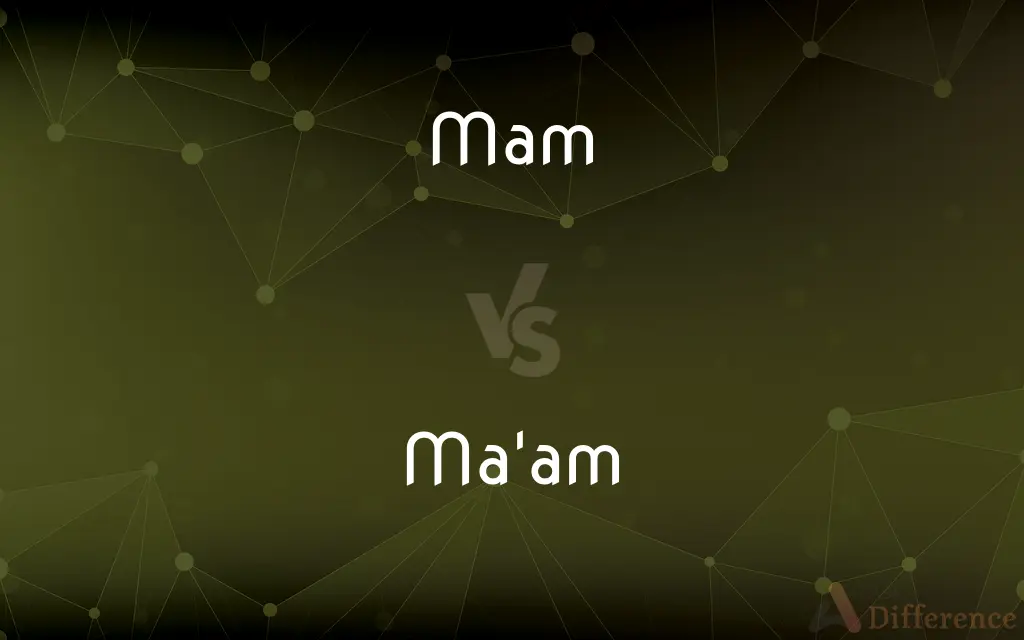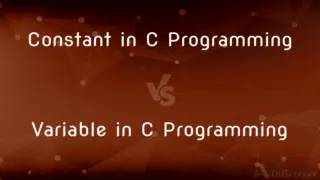Mam vs. Ma'am — What's the Difference?
Edited by Tayyaba Rehman — By Fiza Rafique — Published on December 13, 2023
Mam is a colloquial and regional way to refer to one's mother. Ma'am is a contraction of "madam," a polite form of address to a woman. Both terms show respect but are used in different contexts.

Difference Between Mam and Ma'am
Table of Contents
ADVERTISEMENT
Key Differences
Mam is primarily utilized in some English-speaking regions to address one's mother. This term is intimate and denotes familial closeness. Ma'am, on the other hand, is an abbreviation for "madam" and serves as a courteous term to refer to or address any woman, particularly in a formal setting.
Mam, in its essence, stems from a personal and affectionate place. It's akin to calling someone "mom" or "mommy." Such terms are reserved for personal or familial use, indicating warmth and closeness. Ma'am, conversely, is a neutral, formal address. It does not suggest familial ties but rather a sense of respect towards the woman being addressed.
While Mam is used within certain regional dialects, its usage might be unfamiliar or even considered incorrect in other parts of the world. In contrast, Ma'am is recognized and accepted internationally as a polite address for women and is taught as such in English language courses.
Mam's context is straightforward – it's a term of endearment for mothers. Young children, or even adults referring to their mothers, might use this term in regions where it's prevalent. Ma'am, meanwhile, has a broader usage. Whether it's in service industries, educational settings, or everyday conversation, "ma'am" can be employed to address any woman in a polite manner.
The pronunciation of Mam is consistent with "jam," emphasizing its casual tone. Ma'am, on the other hand, often sounds like "mam" but its origin from "madam" reminds users of its formal intention and purpose.
ADVERTISEMENT
Comparison Chart
Origin
Familial term
Contraction of "madam"
Usage
Personal, endearing
Formal, polite
Context
Referring to mother
Addressing any woman respectfully
Pronunciation
Similar to "jam"
Often sounds like "mam"
Prevalence
Regional dialects
Internationally recognized
Compare with Definitions
Mam
A variation of "mom" or "mommy" used in specific parts of the world.
Mam knows just how to cheer me up.
Ma'am
A polite form of address used in professional or formal settings.
Ma'am, your appointment is at 3 pm.
Mam
An affectionate nickname for one's mother.
Mam always makes the best pies.
Ma'am
A term of respect towards any female, regardless of age or relationship.
Excuse me, ma'am, you dropped your wallet.
Mam
A colloquial term for mother in certain regions.
Mam, can I go outside to play?
Ma'am
A formal address for women, especially in service contexts.
Your table is ready, ma'am.
Mam
A familiar term used by children addressing their mother.
Mam, I finished my homework!
Ma'am
A universally accepted term in the English language to show courtesy to women.
Thank you, ma'am, for your assistance.
Mam
A regional dialect word, especially in the North of England, meaning mother.
I'll ask Mam if she needs anything from the store.
Ma'am
A contraction of "madam" used to address or refer to a woman in a polite manner.
Can I help you, ma'am?
Mam
Mum, mom; diminutive of mother.
Mam
Mamma.
Mam
A member of a Mayan people of southwestern Guatemala
Mam
A Mayan language spoken by the Mam people
Common Curiosities
What does Ma'am stand for?
Ma'am is a contraction of the word "madam."
Is Mam a proper word in English?
Yes, "Mam" is used in specific regions to refer to one's mother.
Can I use Mam to address any woman?
No, "Mam" is typically reserved for addressing one's mother.
Is Mam a term used universally?
No, "Mam" is more prevalent in certain regional dialects.
In what situations is Ma'am appropriate?
Ma'am is suitable for formal and polite situations when addressing a woman.
Is Mam derived from the word Ma'am?
No, "Mam" is more closely related to "mom" or "mommy," while "Ma'am" is derived from "madam."
Can I call my teacher Mam?
It depends on regional norms, but "Ma'am" is more universally accepted for addressing teachers.
Is Ma'am a term of respect?
Yes, "Ma'am" is used as a respectful way to address women.
Can Mam and Mom be used interchangeably?
Depending on the region, "Mam" and "Mom" might be used interchangeably, but "Mam" is more specific to certain areas.
Are there any other contractions like Ma'am for addressing people?
Yes, "sir" for men, though it's not a contraction, is similarly used to address men politely.
Can I write Ma'am without the apostrophe?
No, the correct spelling for the contraction of "madam" is "Ma'am" with an apostrophe.
Is it necessary to use Ma'am when addressing a woman?
While it's polite, it's not always necessary; context matters.
How do I pronounce Ma'am?
Ma'am often sounds like "mam" but originates from "madam."
Is it correct to use Ma'am for younger women?
Yes, "Ma'am" can be used to address women of all ages respectfully.
Is Mam a formal term?
No, "Mam" is a more casual and intimate term.
Share Your Discovery

Previous Comparison
Blue Collar vs. White Collar
Next Comparison
Constant in C Programming vs. Variable in C ProgrammingAuthor Spotlight
Written by
Fiza RafiqueFiza Rafique is a skilled content writer at AskDifference.com, where she meticulously refines and enhances written pieces. Drawing from her vast editorial expertise, Fiza ensures clarity, accuracy, and precision in every article. Passionate about language, she continually seeks to elevate the quality of content for readers worldwide.
Edited by
Tayyaba RehmanTayyaba Rehman is a distinguished writer, currently serving as a primary contributor to askdifference.com. As a researcher in semantics and etymology, Tayyaba's passion for the complexity of languages and their distinctions has found a perfect home on the platform. Tayyaba delves into the intricacies of language, distinguishing between commonly confused words and phrases, thereby providing clarity for readers worldwide.












































